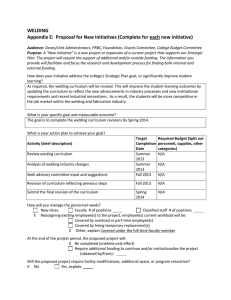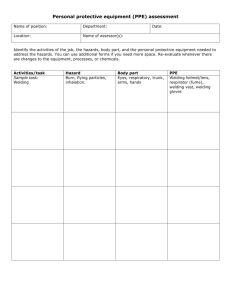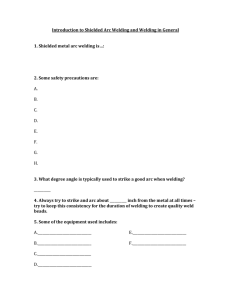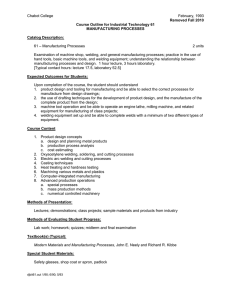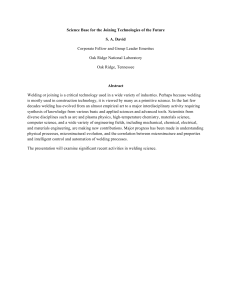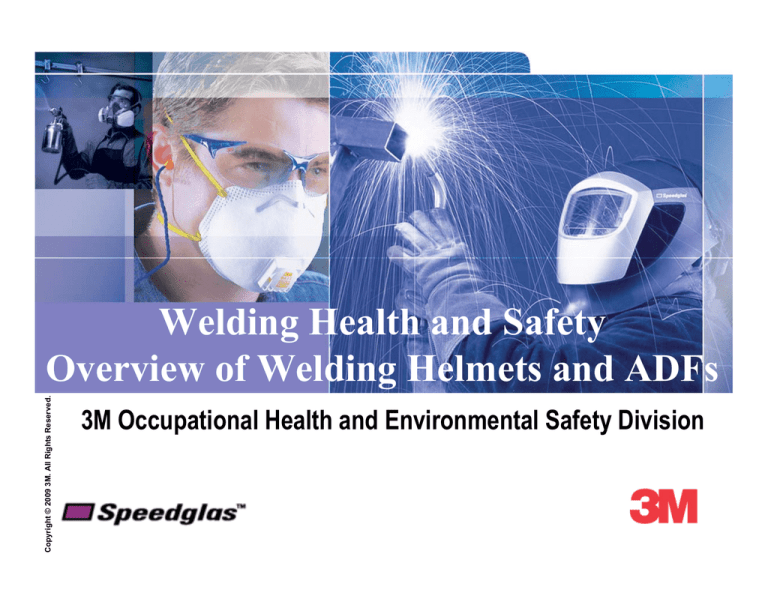
Copyright © 2009 3M. All Rights Reserved.
Welding Health and Safety
Overview of Welding Helmets and ADFs
3M Occupational Health and Environmental Safety Division
Welding and Safety
Copyright © 2009 3M. All Rights Reserved.
This training material has been prepared by 3M for the
purpose of helping you understand applicable OSHA
standards, or other safety regulations, workplace hazards, and
safe workplace practices.
It is the responsibility of both the employer and employees to
comply with safety rules and regulations and to use all safety
equipment in accordance with product user instructions,
limitations, and warnings. Questions regarding proper use
should be directed to the employer or the equipment
manufacturer. For 3M products call 3M Technical Service 1800-243-4630.
Modifications to this copyrighted material is prohibited.
Presentation Overview
Regulation & Standards Summary
Welding Helmets Overview
Purpose
Variety of Welding Helmets
Copyright © 2009 3M. All Rights Reserved.
Auto Darkening Filters (ADFs)
Construction
Safety Benefits of Auto-Darkening Filters
Differences in ADF Technology
Summary
Copyright © 2009 3M. All Rights Reserved.
Welding Regulations for USA
Workplace Regulations:
OSHA 1910 Subpart Q –
Welding Cutting and
Brazing
OSHA 1926 Subpart J –
Welding and Cutting
OSHA 1915.51 – Occ.
Safety & Health Standards
for Shipyards
MSHA 75.1106 – Welding,
cutting, or soldering with
arc or flame underground
Performance Standards:
ANSI Z87.1-2003 –
Occupational & Educational
Personal Eye & Face
Protection Devices (welding
shield compliance required
by OSHA)
ANSI Z49.1-2005 – Safety
in Welding, Cutting and
Allied Processes (available
free at: www.aws.org)
Eye and Face Protection
Welding helmets are required to
meet ANSI Z87.1-2003
Copyright © 2009 3M. All Rights Reserved.
Specifies testing requirements for
welding shade filters and helmets
Requires use of safety spectacles
in conjunction with all welding
helmets
ANSI approved welding
helmets and filters required by
OSHA (USA)
ANSI Z49.1 Shade Recommendations
Arc
Minimum
Welding
Current Protective
Process
(Amperes)
Shade
Less than
60
7
Shielded
60 to 160
8
Metal Arc
160 to 250
10
Welding
250 to 550
11
(SMAW)
Less than
60
7
10
Gas Metal Arc 60 to 160
160 to 250
10
Welding
10
(GMAW)(MIG) 250 to 550
Copyright © 2009 3M. All Rights Reserved.
Less than
50
Gas Tungsten
50
to
150
Arc Welding
(GTAW)(TIG) 150 to 500
8
8
10
Suggested
Protective
Shade
(Comfort)
10
12
14
11
12
14
10
12
14
• Dependent on welding process
and amperage
• Varies according to individual
and viewing distance
Copyright © 2009 3M. All Rights Reserved.
Welding Helmets Overview
Welding Helmets
Copyright © 2009 3M. All Rights Reserved.
Definition provided by ANSI Z-87.1-2003 Standard:
“Welding helmets and handshields are protective
devices to provide protection for the eyes and face
against optical radiation and spatter. Welding
helmets shall be used only in conjunction with
spectacles and/or goggles.”
Copyright © 2009 3M. All Rights Reserved.
Passive Handshields and Welding Helmets
• Check for compliance to ANSI Z87.1
standards
• Relatively inexpensive ($20-50)
• Single shade glass or plastic lens
• Basic feature sets, limited comfort and
productivity enhancement features
• Hand-held and headgear mounted available
• May be adapted for use with hardhats
• Flip-up models available for clear viewing
for chipping, grinding and set-up
Copyright © 2009 3M. All Rights Reserved.
Auto Darkening Welding Helmets
• Check for compliance to ANSI Z87.1
standard
• Wide range in initial investment cost based
on quality and features ($75-500)
• Improves quality and productivity, allows the
user to keep the welding helmet down during
electrode placement (up to 25-40%
productivity increase)
• Improves comfort, reduces neck strain of
continuous nodding, especially over time
• Potentially reduces eye injuries due to helmet
often being “down” more frequently
Copyright © 2009 3M. All Rights Reserved.
Auto Darkening Welding Helmets – Specialty Features
Sidewindow versions available for
increased peripheral vision and safety
Ventilated helmets to help decrease heat
and humidity buildup and fogging of ADF
Flip-up models available for clear viewing
for chipping, grinding and weld prep
Extended coverage options available for
more coverage from UV, spark and spatter
Some models available with powered and
supplied air respiratory protection
Copyright © 2009 3M. All Rights Reserved.
Auto Darkening Filters
(ADF’s)
Arc Radiation Hazards
Copyright © 2009 3M. All Rights Reserved.
Arc radiation covers a wider frequency range than
sunlight
Copyright © 2009 3M. All Rights Reserved.
Auto Darkening Filter (ADF) Construction
ADF Construction
Copyright © 2009 3M. All Rights Reserved.
UV/IR
Polarizing
Polarizing
LC-cell
LC-cell
band-pass
filter
filter
filter (mirror)
Polarizing
filter
Band-Pass Filter
Copyright © 2009 3M. All Rights Reserved.
Protects from IR and UV light
Allows only visible light to pass through
Always working – not part of electrical circuitry or
switching part of filter
Liquid Crystal / Polarizing Filter
Copyright © 2009 3M. All Rights Reserved.
Work together as an electronic “shutter”
Only acting on visible light passing through the bandpass filter
Failure of this filter element to turn dark does not
result in eye injury such as arc-eye (see band-pass
filter)
Potential Safety Benefits of Auto-Darkening
Welding Filters
Uninterrupted view of work, during and between
welds helmet is down more consistently
Reduced probability of impact injuries
Reduced arc-eye burns
Reduced neck strain from “nodding”
Copyright © 2009 3M. All Rights Reserved.
Secondary benefits include:
Increased welder productivity
More accurate welds
Less time to train welders
Less scrap and rework
How to Choose an ADF’s They Are Not All the Same!
Welding helmets with auto darkening filters
(ADF) are an essential tool for all welders.
Copyright © 2009 3M. All Rights Reserved.
– ADF’s are an investment similar to any other tool or
equipment purchased by a welder to help them do their job
more efficiently and increased quality.
Before investing in an ADF understand what you
are getting for your money.
– That means understanding the quality, performance, and
durability of the different ADF’s that are on the market and
choosing the one best for you.
How to Choose an ADF’s They Are Not All the Same!
Quality differences affect the performance and life of ADF’s
– All helmets and ADF’s must meet basic minimum ANSI standards
– Quality differences exist between manufacturers and models of ADFs
• These include optics, fit and finish of components, overall functionality.
– Quality differences can affect the durability and performance of ADF’s.
How to find a quality ADF
Copyright © 2009 3M. All Rights Reserved.
– Review the manufacturers product literature and features marked on the box
– Ask questions to find out the quality differences you can’t see
– As with any tool remember the saying “You get what you pay for.”
Educate yourself by asking questions before you buy
– The next few slides illustrate some of the differences in ADF’s that are
more difficult to see from the outside.
– Use this information to help drive a discussion prior to investing in a
welding helmet with an ADF.
SpeedglasTM – An Inside Look
Copyright © 2009 3M. All Rights Reserved.
Other:
Sealed button membrane to help protect digital
controls and reduces sweat and liquid infiltration
Replaceable batteries
Silicon coating protects
critical components
from moisture
Custom – multi
function programmed
logic chip minimizes
components and
increase reliability
Sensors mounted on
circuit board minimize
electromagnetic noise
interference from LC,
increasing low amp arc
detection capability
Filter elements are
bonded with optical
adhesive for minimum
distortion and
maximum strength
Brand A - An Inside Look
Copyright © 2009 3M. All Rights Reserved.
Analog controls are
fragile and prone to
moisture and particle
infiltration
Excessive wiring and
circuitry components
increase the potential
for signal interference
and connection
failure.
Spray coated or
unprotected circuit
board components are
vulnerable to
contamination
Brand B - An Inside Look
Copyright © 2009 3M. All Rights Reserved.
Un-bonded filter
elements reduce
optical clarity and
are less durable
Basic electronics
may have difficulty
detecting certain
arc welding
processes
Spray coated or
unprotected circuit
board components
are vulnerable to
contamination
Non-replaceable
batteries eventually
go dead and the lens
becomes nonfunctional
ADF Features for Consideration
Shade range
Selected based on welding processes
Arc detection
Electronic’s ability to detect arc based on welding process
and lighting conditions (outdoors or specialty lighting)
Copyright © 2009 3M. All Rights Reserved.
Switching speed
Recommend switching speed <0.3ms to reduce intermittent
flash
Sensors
Sensor placement and arc detection electronics are most
important, not necessarily the number of sensors
ADF Features for Consideration - Continued
Replaceable batteries
“Solar only” still have batteries on the circuit board, replaceable batteries
will ultimately lead to longer lasting ADF
Optical clarity
Important for puddle control and specialty welding applications
Modes
Welding, grinding, brazing and cutting, tack welding
Delay
Copyright © 2009 3M. All Rights Reserved.
Time needed to allow “hot” welds to cool before returning to light state
Light State
The shade when the ADF is on and not activated by the welding process
Copyright © 2009 3M. All Rights Reserved.
Summary and Learnings
Standards and Regulations applicable to
welding applications
Definition of a welding helmet
Differences between passive and ADF welding
helmets
Specialty features for consideration in welding
helmets
ADF construction and basic working premise
Safety and productivity benefits of a ADF
welding helmet
Differences in quality of ADFs
Features to consider when selecting a ADF
Copyright © 2009 3M. All Rights Reserved.
Thank you!
Welding Health and Safety Topics
3M Occupational Health and Environmental Safety Division

